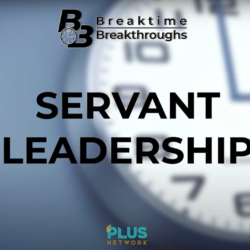Have you ever tried to make a change in your life like go on a diet, start exercising, or stay off social media? Have you ever made a new year’s resolution only to forget about it at the end of January?
Organizational leader and coach Frances Acu believes that the heart of any issue and change begins with the heart. Acu has previously talked about how everyone can be a leader and why servant leaders should model their leadership style after Jesus. In an episode of Breaktime Breakthroughs on Plus Network, she elaborated on the importance of love for servant leaders.
As leaders, we know we constantly need to develop ourselves. As John Maxwell said “Lift our lid!” When we are willing to take intentional actions towards becoming a leader, we see the lid lifted off ourselves and what we can become.However, research has shown that willpower works a lot like a muscle. If we use it a lot, we get tired. When we get tired, we’re very likely to quit.
Many leadership concepts and learnings focus on the outside – the frameworks to follow, behaviors to build, and habits to develop. Yet, in the book “Lead Like Jesus”, we can learn that true leadership change only happens when there is a change in our hearts. Whenever we have the opportunity to influence other people, we need to check whether we’re doing it out of love for them or if we are doing it out of love for ourselves. Are we serving leaders or self-serving leaders?
Simon Sinek, an American Author, had a chance to interact and ask a US Marine General the question: “What makes the marines so great?”. The General simply replied, “Officers eat last.” This interaction inspired Mr. Sinek so much that he made a book out of it and called it “Leaders Eat Last”. In the corporate world, people are always encouraged to look after themselves first. In his book, it was the complete opposite.
Still, this is easier said than done. We may have the desire and strong willpower to try our best to love others and take care of them but it can be pretty exhausting. When we pour so much of ourselves into other people, we find ourselves empty. There are also times when we feel like we’re not getting anything in return. The popular saying “We can’t pour from an empty cup” becomes so real for us.
Ken Blanchard and Phil Hodges suggest that in leadership, we must seek answers to these two questions:
- Whose am I? – Do we know that we are unconditionally loved and forgiven by God? Do we know that we are called and set apart? When we realize that we are loved by God, we can’t help but also share the love that we receive from God with other people. After all, loved people love people.
- Who am I? – Oftentimes, we define ourselves based on who we think we are or on what we hear others say about us. We have to be aware that the enemy’s formula for self-worth is:
My Performance + Opinions of Others= Self-Worth
If we know we belong to God, we can define our identity based on who God created us to be. God created us to be loving.
Ms. Acu shared her journey of surrendering her heart and leadership to Jesus. When she decided to follow Jesus as her model of leadership, she learned that the way to love and lead others is not to love them on our strength and willpower. When we do that, it can be tiring because we only have so much to give. Instead, loving and leading others is the overflow of God’s love.
Others might think that love-based leadership is soft. This is not the kind of leadership that lets people do whatever they want and achieve nothing. Love-based leadership is a kind of leadership that requires us to love others so much that when we influence them, we help them move from who they are, to who God wants them to be. Our definitions of love may vary but when we look to Jesus, then we’re looking at the same definition and source of love. Ken Blanchard and Phil Hodges’s formula states that:
Everything – Love = Nothing
This means that we can try to lead with all our intelligence, knowledge, experience, and strength but without love, we’ll never be truly successful at leading others. We might say to ourselves, “I want to lead with love but what does love look like?” Thankfully, the Bible painted the picture of love which can be found in 1 Corinthians 13.
Tip: Replace the word “love” with your name. By God’s grace, these definitions of love may come true for you. For more stories about professionals, visit PLUS Network on Facebook, Instagram, Twitter, and YouTube.






